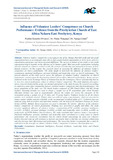Influence of Volunteer Leaders’ Competence on Church Performance: Evidence from the Presbyterian Church of East Africa Nakuru East Presbytery, Kenya

View/
Date
2019-11Author
Mwaura, Pauline Kanuthu
Maina, Waiganjo
Njenga, Gitahi
Metadata
Show full item recordAbstract
Volunteer leaders’ competence is emerging as one of the changes that both profit and non-profit
organizations have to accommodate especially as more people look for opportunities to serve, learn, gain new
organization experiences and derive personal fulfillment. The success or failure of any profit or non-profit
organization largely depends on the efficiency of its human capital. Most non-profit organizations including
churches depend on volunteer workers to take the position of leadership and management because of their
limited resources. In this regard, this research aimed at assessing the influence of volunteer leader’s
competence on church performance. The study sought to determine the influence of volunteer leaders’
commitment, emotional intelligence, personal attributes and leadership styles on church performance. The
general objective of this study was to access the influence of volunteer leaders’ competence on church
performance: evidence from the Presbyterian Church of East Africa Nakuru East Presbytery, Kenya and was
anchored on the Social Exchange Theory of Volunteerism and the Contingency Theory of Leadership that try
to show how church performance relates to volunteer leaders’ competence. This study adopted a descriptive
survey research design and the design was deemed appropriate to the study because the research was seeking
to establish a cause-effect relationship between volunteer leaders’ competence and church performance. The
target population of the study was 750 church leaders composed of 288 Church Elders and 462 Group
Leaders. Nassiuma formula was used to obtain a sample size of 88 respondents after which Neyman
allocation formula was used to proportionally allocate the sample size across the categories of the
respondents giving a sample size of 33 elders and 55 group leaders. Volunteer leaders in all the eleven
parishes were randomly selected. Primary data was collected using a questionnaire which was pretested to
ensure content validity and also reliability at the recommended Cronbach alpha of 0.7. Collected data was
analyzed using both descriptive and inferential statistics with the help of the Statistical Package for Social
Science (SPSS). Multiple linear regression was used to determine the relative effectives of the volunteer
leaders’ competence on church performance. Findings were presented in graphs and tables. The study
revealed significant influence of volunteer leaders’ commitment(t=4.356, p=0.00), emotional intelligence
(t=3.012, p=0.003), personal attributes (t=4.654, p=0.00) and leadership styles (t=4.654, p=0.00) on
performance of PCEA Nakuru East Presbytery. The study concluded that volunteer leaders’ commitment,
emotional intelligence, personal attributes and leadership styles contributed to a large extent to church
performance. The researcher recommends that the church should acknowledge the great role volunteer
leaders play and come up with strategies to motivate and inspire them so that they can continue volunteering
and also increase their effectiveness and performance. The researcher further recommends that a study be
undertaken on the strategies to enhance volunteer leaders’ competence to increase church performance.
Collections
- Publications 2019 [91]
